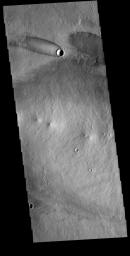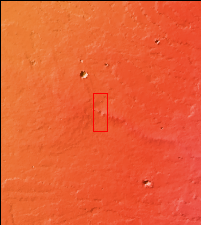
|
Daedalia Planum Windstreak
- Click the image above for a larger view
- Full-Res JPEG (1344 x 2646) (457.5 kB)
- Full-Res TIFF (1344 x 2646) (2.7 MB)
Caption:
The "tail" behind the crater at the top of this VIS image is called a windstreak. This feature is formed by winds blowing over/in and around the crater. Turbulence in the wind will erode or deposit fine materials, creating the windstreak. Windstreaks form on the down wind side of the crater, and indicate winds from the ESE. The small hills below the windstreak are small volcanic constructs. This image is located in the extensive lava plains called Daedalia Planum.
Orbit Number: 65310 Latitude: -10.2729 Longitude: 226.476 Instrument: VIS Captured: 2016-09-03 11:24
Background Info:
Please see the THEMIS Data Citation Note for details on crediting THEMIS images.
NASA's Jet Propulsion Laboratory manages the 2001 Mars Odyssey mission for NASA's Science Mission Directorate, Washington, D.C. The Thermal Emission Imaging System (THEMIS) was developed by Arizona State University, Tempe, in collaboration with Raytheon Santa Barbara Remote Sensing. The THEMIS investigation is led by Dr. Philip Christensen at Arizona State University. Lockheed Martin Astronautics, Denver, is the prime contractor for the Odyssey project, and developed and built the orbiter. Mission operations are conducted jointly from Lockheed Martin and from JPL, a division of the California Institute of Technology in Pasadena.
Cataloging Keywords:
| Name | Value | Additional Values |
|---|---|---|
| Target | Mars | |
| System | ||
| Target Type | Planet | |
| Mission | 2001 Mars Odyssey | |
| Instrument Host | Mars Odyssey | |
| Host Type | Orbiter | |
| Instrument | Thermal Emission Imaging System (THEMIS) | |
| Detector | ||
| Extra Keywords | Crater, Grayscale, Thermal, Volcano | |
| Acquisition Date | ||
| Release Date | 2016-10-26 | |
| Date in Caption | 2016-09-03 | |
| Image Credit | NASA/JPL-Caltech/ASU | |
| Source | photojournal.jpl.nasa.gov/catalog/PIA21151 | |
| Identifier | PIA21151 | |

